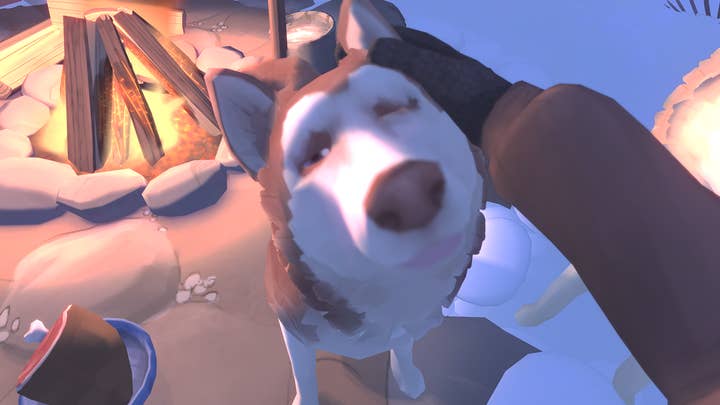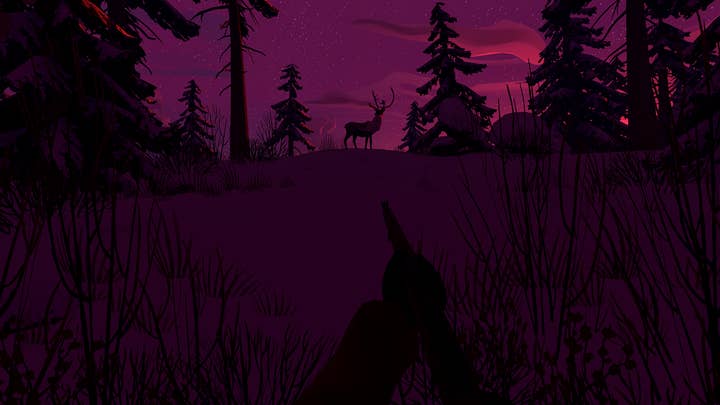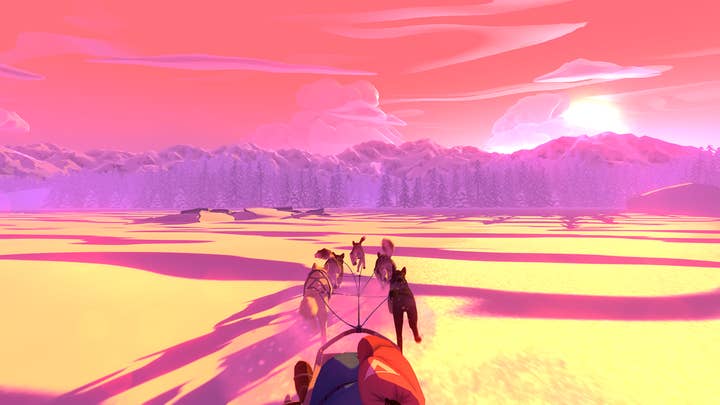The Red Lantern: Breaking trail with emergent storytelling
Timberline Studios CEO Lindsey Rostal shares her narrative philosophy, and how it feeds into the themes of her studio's debut title
At the end of the Iditarod sled dog race, there are prizes for those with the best times, best rookie racers, and standout dogs. And there's a prize for the persistent musher who finishes in last place, often days behind the race's winners: the red lantern.
"It's not the idea of getting the trophy," says Lindsey Rostal, explaining the title of her upcoming game. "It's persevering, and pulling it off because you want to. Taking the journey and doing the thing you wanted to do."
In many ways, The Red Lantern seems to be a perfect culmination of Rostal's personal journey so far. She has been playing games since she was four or five years-old, when her mother -- who was a software engineer -- would bring them home on floppy disks. She studied programming in high school, some computer science in college, but ultimately settled on a biology and pre-med track, which led to a master's degree in film production.
"Instead of a hardcore, branching narrative game, we wanted to find something that made a narrative sandbox for the player"
But Rostal always knew she wanted to work in games, so after some time in film focusing on scriptwriting and storytelling, she produced and co-wrote several chapters of the King's Quest remake with The Odd Gentlemen, before eventually splitting off with Nathan Fulton in 2017 to form Timberline Studios.
The two originally teamed up due to a shared love of good storytelling, and began by working on a new narrative engine that would eventually power The Red Lantern. Before dogs, Alaska, or perseverance in the face of an indifferent natural world were ever in the picture, the focus was always on how that narrative would be told, and how it would involve the player.
"We knew we wanted to work in emergent player narrative," Rostal says. "Instead of having a hardcore, branching narrative game, we wanted to find something that basically made a narrative sandbox for the player, where they have a structure of a story and some of what the main character is going through. But how you get to the end is your real story -- it's not what I'm telling you it is, it's what you decide it is.
"I liken it to the idea that we all graduate, we all have milestones in our life, but that moment for each of us is different because of the things that happen leading up to that moment. So all of our journeys are different. It's not about the ending, it's about what happened getting there. That's what we're trying to accomplish with this game."
Rostal compares what she wants to do with The Red Lantern to the experiences she has in multiplayer games, singling out DayZ as the source of "some of my best narrative moments ever."
"[The idea of] 'You are what you do' gets baked into all of us, and I don't think that's a good thing"
In multiplayer games, she continues, the player creates the story as they play, based on their interactions with others. She tells me about one of her favorite memories in DayZ: she was playing with her brother when she heard the sound of a soda can being opened -- normally a sound associated with another player using a soda healing item. She asked her brother, who said he had just opened a drink at his desk. Thinking the coast was clear, Rostal moved through the building, only to find another player -- the actual soda-drinking culprit -- waiting downstairs.
That's the kind of narrative Rostal wants to bring to The Red Lantern, one where the player has created a story in their head about what just happened. But Red Lantern is a single-player game, so the emergent storytelling comes in with how the player manages the traversal and survival aspects of the game. Do they feed their dogs first, or themselves? Do they shoot wildlife for meat, or leave it alone? How long do they travel? How often do they rest? And why do they make those calls to begin with?

"Near the end of the demo, there's an elk you can shoot or not," she says. "Normally in a branching narrative, one might choose based on values. But here, your dogs might be very hungry, you might be very hungry, it's close, you're not going to miss -- it becomes a more nuanced choice."
The kind of storytelling that interests Rostal fits neatly with the themes she wants to explore -- that of being defined by the totality of one's self, rather than any individual moment, action, or choice.
"When we set out to do this whole indie thing, we wanted to be in a situation where we could make something weird and personal"
"[The idea of] 'You are what you do' gets baked into all of us, and I don't think that's a good thing," Rostal says. "I don't think it's good to go to a party and ask 'What do you do [for a living]?' and judge someone based on the value of what they can do for you. I'm a person who loves my dogs. I'm a person who wants to take them on a mile-long walk to get a bagel every Saturday. I'm a person that makes Chemex coffee every morning and then a side cappuccino. I'm a person with a biology degree that I kind of got on a whim.
"Those are the things that are who we are, and so this game is a game where [the main character] feels that pressure and hits the reset button a little too hard."
Nature, emergent storytelling, and games -- so far, very Rostal. But The Red Lantern is a game about a young woman who heads out into the Alaskan bush with a team of five sled dogs, and ultimately must find her way back home. How does dog sledding fit in?

Rostal tells me her interest in dog sledding came from a visit to Iceland, when she was meant to go dog sledding but had the trip canceled due to 40mph winds. But the idea stuck. Rostal eventually did get to dog sled at an Iditarod training camp as part of her research for The Red Lantern. Her research also included camping in Alaska, interviewing friends and experts, and reading plenty of books on the subject.
As far removed as Rostal might be from the subject matter, she's still telling a story that's personal both to her and the other members of Timberline Studios.
"We're not necessarily big 'hero' people. We're more, 'What does it mean to support things?'"
"When we set out to do this whole indie thing, we wanted to be in a situation where we could make something weird and personal, which can be harder to do sometimes," she says. "I think it's getting easier in AAA these days, because we don't have the same demands to sell so many units that we have to put in the same loops other people do. I don't have to put in a really long, juicy shooting loop to sell two million copies. We were able to tell something that is personal and reflects all of us, too, and hopefully stands out.
"All games have some personal element to them. All games are also a little bit about making the game themselves. I went through some harder times earlier in the development of this game, and I had to stop for a while, because I was writing so dark. That wasn't what I wanted the game to be."
The Red Lantern will be Timberline Studios' debut, and though it's far too early to discuss anything the studio might do after that, Rostal says its goals and ideas extend beyond any one project. Along with ambitions for more experimental, emergent storytelling methods, we will see the themes explored in The Red Lantern -- of perseverance, identity, and making the journey count -- in the team's work in the future.
"We think a lot about our relationship with the world, how small we are," she says. "There's a little bit of that in this game. The concept of identity, the concept of why you need to feel like a hero -- in this game you're not, you're just someone trying to make it work -- and what our relationship is with the world. We have a good idea of what we're going to work on next, but I think you'll see that as a theme in our things.
"We're not necessarily big 'hero' people. We're more, 'What does it mean to support things? What does it mean to have different roles in the world?'"


